I tried to use get_unchecked() instead of the [] index operator to get performance improvement in the s() function of my des crate.
However, it does not result in a visible performance improvement even thought the [] (or get_unchecked()) function is called 4.8 billion times in my benchmark. I would have thought that calling get_unchecked() 4.8 billion times instead of [] would result in a 2-second time improvement on my Intel Core 2 Duo 2.4 GHz processor.
I made this small benchmark to have a small code to show you:
#![feature(test)]
extern crate test;
fn main() {
}
pub fn s(box_id: usize, block: u64) -> u64 {
const TABLES: [[[u64; 16]; 4]; 8] =
[[[ 14, 4, 13, 1, 2, 15, 11, 8, 3, 10, 6, 12, 5, 9, 0, 7]
, [ 0, 15, 7, 4, 14, 2, 13, 1, 10, 6, 12, 11, 9, 5, 3, 8]
, [ 4, 1, 14, 8, 13, 6, 2, 11, 15, 12, 9, 7, 3, 10, 5, 0]
, [ 15, 12, 8, 2, 4, 9, 1, 7, 5, 11, 3, 14, 10, 0, 6, 13]
],
[ [ 15, 1, 8, 14, 6, 11, 3, 4, 9, 7, 2, 13, 12, 0, 5, 10]
, [ 3, 13, 4, 7, 15, 2, 8, 14, 12, 0, 1, 10, 6, 9, 11, 5]
, [ 0, 14, 7, 11, 10, 4, 13, 1, 5, 8, 12, 6, 9, 3, 2, 15]
, [ 13, 8, 10, 1, 3, 15, 4, 2, 11, 6, 7, 12, 0, 5, 14, 9]
],
[ [ 10, 0, 9, 14, 6, 3, 15, 5, 1, 13, 12, 7, 11, 4, 2, 8]
, [ 13, 7, 0, 9, 3, 4, 6, 10, 2, 8, 5, 14, 12, 11, 15, 1]
, [ 13, 6, 4, 9, 8, 15, 3, 0, 11, 1, 2, 12, 5, 10, 14, 7]
, [ 1, 10, 13, 0, 6, 9, 8, 7, 4, 15, 14, 3, 11, 5, 2, 12]
],
[ [ 7, 13, 14, 3, 0, 6, 9, 10, 1, 2, 8, 5, 11, 12, 4, 15]
, [ 13, 8, 11, 5, 6, 15, 0, 3, 4, 7, 2, 12, 1, 10, 14, 9]
, [ 10, 6, 9, 0, 12, 11, 7, 13, 15, 1, 3, 14, 5, 2, 8, 4]
, [ 3, 15, 0, 6, 10, 1, 13, 8, 9, 4, 5, 11, 12, 7, 2, 14]
],
[ [ 2, 12, 4, 1, 7, 10, 11, 6, 8, 5, 3, 15, 13, 0, 14, 9]
, [ 14, 11, 2, 12, 4, 7, 13, 1, 5, 0, 15, 10, 3, 9, 8, 6]
, [ 4, 2, 1, 11, 10, 13, 7, 8, 15, 9, 12, 5, 6, 3, 0, 14]
, [ 11, 8, 12, 7, 1, 14, 2, 13, 6, 15, 0, 9, 10, 4, 5, 3]
],
[ [ 12, 1, 10, 15, 9, 2, 6, 8, 0, 13, 3, 4, 14, 7, 5, 11]
, [ 10, 15, 4, 2, 7, 12, 9, 5, 6, 1, 13, 14, 0, 11, 3, 8]
, [ 9, 14, 15, 5, 2, 8, 12, 3, 7, 0, 4, 10, 1, 13, 11, 6]
, [ 4, 3, 2, 12, 9, 5, 15, 10, 11, 14, 1, 7, 6, 0, 8, 13]
],
[ [ 4, 11, 2, 14, 15, 0, 8, 13, 3, 12, 9, 7, 5, 10, 6, 1]
, [ 13, 0, 11, 7, 4, 9, 1, 10, 14, 3, 5, 12, 2, 15, 8, 6]
, [ 1, 4, 11, 13, 12, 3, 7, 14, 10, 15, 6, 8, 0, 5, 9, 2]
, [ 6, 11, 13, 8, 1, 4, 10, 7, 9, 5, 0, 15, 14, 2, 3, 12]
],
[ [ 13, 2, 8, 4, 6, 15, 11, 1, 10, 9, 3, 14, 5, 0, 12, 7]
, [ 1, 15, 13, 8, 10, 3, 7, 4, 12, 5, 6, 11, 0, 14, 9, 2]
, [ 7, 11, 4, 1, 9, 12, 14, 2, 0, 6, 10, 13, 15, 3, 5, 8]
, [ 2, 1, 14, 7, 4, 10, 8, 13, 15, 12, 9, 0, 3, 5, 6, 11]
]];
let i = ((block & 0x20) >> 4 | (block & 1)) as usize;
let j = ((block & 0x1E) >> 1) as usize;
unsafe { *TABLES.get_unchecked(box_id).get_unchecked(i).get_unchecked(j) }
//TABLES[box_id][i][j]
}
#[cfg(test)]
mod bench {
use test::{Bencher, black_box};
use super::s;
#[bench]
fn bench_s(bencher: &mut Bencher) {
bencher.iter(|| {
let box_id = black_box(7);
(0 .. 40_000_000).fold(0, |acc, block| acc + s(box_id, block))
});
}
}
The first time I ran this benchmark with [], it took less time than the version with get_unchecked() (even though the get_unchecked() version seems a little bit faster on average).
I am not sure it really reflects my real-life benchmark (which consists of encrypting a big file), but it gives an idea.
I checked the assembly to be sure that the compiler did not optimize away the bound checking.
Here is the version with get_unchecked():
0000000000009360 <_ZN3des7s_table17hbabdd9dee72331a5E>:
9360: 48 89 f0 mov %rsi,%rax
9363: 48 c1 e8 04 shr $0x4,%rax
9367: 83 e0 02 and $0x2,%eax
936a: 89 f1 mov %esi,%ecx
936c: 83 e1 01 and $0x1,%ecx
936f: 48 09 c1 or %rax,%rcx
9372: 48 c1 e7 09 shl $0x9,%rdi
9376: 48 8d 05 93 57 04 00 lea 0x45793(%rip),%rax # 4eb10 <ref10404>
937d: 48 01 f8 add %rdi,%rax
9380: 48 c1 e1 07 shl $0x7,%rcx
9384: 48 01 c1 add %rax,%rcx
9387: 83 e6 1e and $0x1e,%esi
938a: 48 8b 04 b1 mov (%rcx,%rsi,4),%rax
938e: c3 retq
938f: 90 nop
And here is the version with []:
0000000000009390 <_ZN3des7s_table17hbabdd9dee72331a5E>:
9390: 50 push %rax
9391: 48 89 f8 mov %rdi,%rax
9394: 48 83 f8 07 cmp $0x7,%rax
9398: 77 30 ja 93ca <_ZN3des7s_table17hbabdd9dee72331a5E+0x3a>
939a: 48 89 f1 mov %rsi,%rcx
939d: 48 c1 e9 04 shr $0x4,%rcx
93a1: 83 e1 02 and $0x2,%ecx
93a4: 89 f2 mov %esi,%edx
93a6: 83 e2 01 and $0x1,%edx
93a9: 48 09 ca or %rcx,%rdx
93ac: 48 c1 e0 09 shl $0x9,%rax
93b0: 48 8d 0d 99 57 04 00 lea 0x45799(%rip),%rcx # 4eb50 <const10401>
93b7: 48 01 c1 add %rax,%rcx
93ba: 48 c1 e2 07 shl $0x7,%rdx
93be: 48 01 ca add %rcx,%rdx
93c1: 83 e6 1e and $0x1e,%esi
93c4: 48 8b 04 b2 mov (%rdx,%rsi,4),%rax
93c8: 59 pop %rcx
93c9: c3 retq
93ca: 48 8d 3d b7 a3 25 00 lea 0x25a3b7(%rip),%rdi # 263788 <panic_bounds_check_loc10404>
93d1: ba 08 00 00 00 mov $0x8,%edx
93d6: 48 89 c6 mov %rax,%rsi
93d9: e8 82 25 04 00 callq 4b960 <_ZN4core9panicking18panic_bounds_check17hb2d969c3cc11ed08E>
93de: 66 90 xchg %ax,%ax
We can see that the get_unchecked() version is smaller and that the version with [] check bounds.
Both versions are compiled in release mode.
Why is the get_unchecked() version not faster than that?
I think it should be at least a couple of seconds faster than the [] version when get_unchecked()/[] is called 4.8 billion times.
Edit: I profiled the code using valgrind.
The version with [] shows a cost of 10 for the line with the array indexing while the version with get_unchecked() shows a cost of less than 1 (see the images below).
However, the costs of the function (see on the left of the images) stayed the same. This is strange. Does anybody have an explanation?

